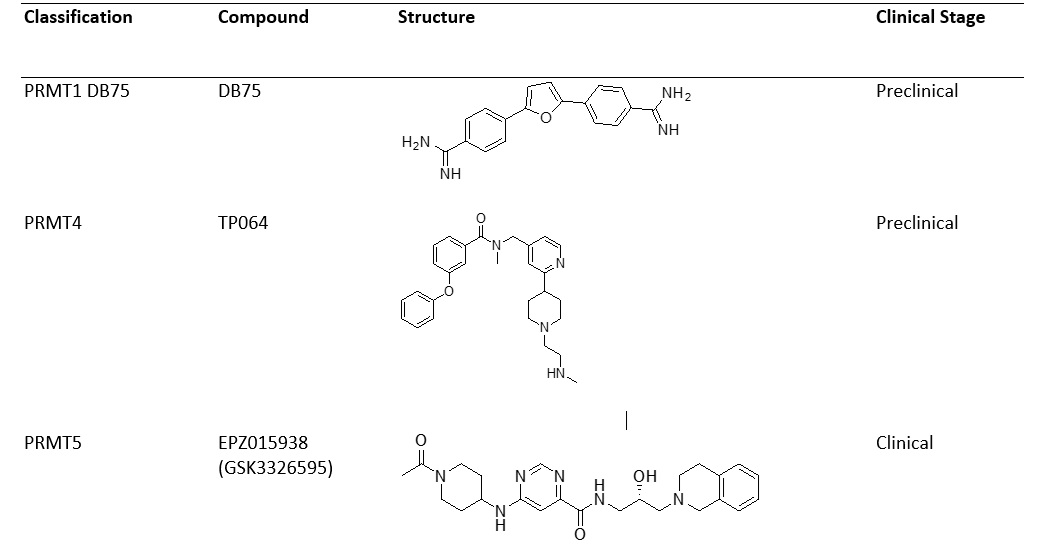Recent Advances in Structural Aspects of Small Molecules as Epigenetic Inhibitors in Cancer Therapeutics

DOI:
https://doi.org/10.54060/a2zjournals.jase.98Keywords:
Epigenetics, Small molecules, Cancer, DNA Methyltransferase Inhibitors, HistoneAbstract
Cancer is a non-contagious disease whose treatment poses considerable difficulty for the worldwide healthcare system, even though numerous pharmacological and therapeutic advancements have been achieved. Although cancer rates are going up, survival rates have also improved in many cases, largely thanks to better and more specific drugs. These new drugs target specific changes in tumors, which are identified molecular testing. These changes can be in the deoxyribonucleic acid (DNA) sequence, or in the ‘epigenetics’, which does not change the DNA sequence. Importantly epigenetic changes can be reversed, unlike DNA changes. Different types of epigenetic enzymes which target corresponding protein domains, emphasize DNA methylation, histone modifications, and microRNA-mediated cooperation with epi-genetic modification, and highlight recent achievements in developing targets for epigenetic inhibitor therapy. This article reviews current anticancer small-molecule inhibitors targeting epigenetic modified enzymes and displays their performances in different stages of clinical trials.
Downloads
References
W. Xiao, Q. Zhou, X. Wen, R. Wang, R. Liu, T. Wang, J. Shi, Y. Hu and J. Hou, “Small-Molecule Inhibitors Overcome Epi-genetic Reprogramming for Cancer Therapy”. J. Front. Pharmacol. Vol 12 Art No. 702360, 2021. doi: 10.3389/fphar.2021.702360
X. Yu, H. Zhao, R. Wang, et al. “Cancer epigenetics: from laboratory studies and clinical trials to precision medi-cine”, Cell Death Discov. vol.10, pp 28, 2024.
N. Srivastava*, Efficient TBAI-CS2 Promoted Synthesis of Substituted Hydrazinecarbodithiolates Organic Preparation and Procedures International (OPPI), Vol 54, issue 6, 2022, 569-577. DOI: 10.1080/00304948.2022.2111171
L. Ren, Y. Yang, W. Li, H. Yang, Y. Zhang, B. Ge, S. Zhang, “Recent advances in epigenetic anticancer therapeutics and future perspectives” Front Genet. Vol.13, art no.1085391, 2023. doi: 10.3389/fgene.2022.1085391. PMID: 36685834; PMCID: PMC9845602.
A. Farsetti, B. Illi, C. Gaetano, “How epigenetics impacts on human diseases”, Eur J Intern Med. Vol. 114, pp 15-22, 2023. doi: 10.1016/j.ejim.2023.05.036. Epub 2023 Jun 3. PMID: 37277249.
Y.L. Wu, Z.J. Lin, C.C. Li, et al, “Epigenetic regulation in metabolic diseases: mechanisms and advances in clinical study” Sig Transduct Target Ther vol. 8, pp. 98, 2023.
S.K. Chakrabarti, D. Chattopadhyay, “Expanding Role of Epigenetics in Human Health and Disease”, Explor Res Hy-pothesis Med. Vol. 9 issue 3, pp. 221-235, 2024. doi: 10.14218/ERHM.2023.00086.
S. Sharma, T.K. Kelly, P.A. Jones, “Epigenetics in cancer. Carcinogenesis”, vol. 31 issue 1, pp. 27-36, 2010 doi: 10.1093/carcin/bgp220. Epub 2009 Sep 13. PMID: 19752007; PMCID: PMC2802667.
N. Srivastava, M. Saxena, “Novel Synthesis of Symmetrical Dialkyl/ Diaryl trithiocarbonates in Non-aqueous Medium at Room Temperature Using CS2 CS2CO3 and Alkyl/aryl halide”, Rasayan Journal of Chemistry, vol. 12, issue 1, 333-337, 2019.
R. Lakshminarasimhan, G. Liang, “The Role of DNA Methylation in Cancer”, Adv Exp Med Biol. vol. 945, pp. 151-172, 2016. doi: 10.1007/978-3-319-43624-1_7. PMID: 27826838; PMCID: PMC7409375.
L. Li, C. Li, H. Mao, et al. “Epigenetic inactivation of the CpG demethylase TET1 as a DNA methylation feedback loop in human cancers”, Sci Rep vol. 6, art no. 26591, 2016.
R. Kishore, M. Kamboj, M. Shukla, D. Chaturvedi, N. Srivastava, “Novel Synthetic Strategy of Cyclic Dithiocarbamates Catalyzed by Triton-B”, Asian Journal of Chemistry, vol. 31, issue 5, pp. 1091-1094, 2019. http://dx.doi.org/10.14233/ajchem.2019.21830
S.B. Hake, A. Xiao, C.D. Allis, “Linking the epigenetic 'language' of covalent histone modifications to cancer”, Br J Can-cer, vol 90 issue 4, pp. 61-9, 2004. doi: 10.1038/sj.bjc.6601575
P. hi, C. Allis, G. Wang, “Covalent histone modifications — miswritten, misinterpreted and mis-erased in human can-cers” Nat Rev Cancer vol. 10, pp. 457–469, 2010.
L.J. Castro-Muñoz, E.V. Ulloa, C. Sahlgren, M. Lizano, E. De La Cruz-Hernández, A. Contreras-Paredes, “Modulating ep-igenetic modifications for cancer therapy”, Oncol Rep vol. 49, pp. 59, 2023.
M. Fardi, S. Solali, M. Farshdousti Hagh, “Epigenetic mechanisms as a new approach in cancer treatment: An updated review”, Genes Dis. Vol. 5, issue 4, pp. 304-311, 2018. doi: 10.1016/j.gendis.2018.06.003. PMID: 30591931; PMCID: PMC6303480.
S. Sharma, T.K. Kelly, P.A. Jones, “Epigenetics in cancer. Carcinogenesis, 2010 vol. 31, issue 1, 27-36. doi: 10.1093/carcin/bgp220. Epub 2009 Sep 13. PMID: 19752007; PMCID: PMC2802667.
Z. Zhang, G. Wang, Y. Li, D. Lei, J. Xiang, L. Ouyang, Y. Wang, J. Yang, Recent progress in DNA methyltransferase inhib-itors as anticancer agents, Front Pharmacol. Vol. 13, art no. 1072651, 2022. doi: 10.3389/fphar.2022.1072651. PMID: 37077808; PMCID: PMC10107375.
Front. Oncol. , 01 May 2014 Sec. Cancer Molecular Targets and Therapeutics Vol. 4, 2014.
J. Zhang, C. Yang, C. Wu, W. Cui, L. Wang, “DNA Methyltransferases in Cancer: Biology, Paradox, Aberrations, and Targeted Therapy”, Cancers vol. 12, art no. 2123, 2020. https://doi.org/10.3390/cancers12082123
K. Nakamura, K. Aizawa, K. Nakabayashi, N. Kato, J. Yamauchi, et al. “DNA methyltransferase inhibitor zebularine in-hibits human hepatic carcinoma cells proliferation and induces apoptosis”, PLoS One. Vol. 8 issue 1 art no. e54036, 2013. doi: 10.1371/journal.pone.0054036. Epub 2013 Jan 8. PMID: 23320119; PMCID: PMC3540068.
L. Zhou, X. Cheng, B.A. Connolly, M.J. Dickman, P.J. Hurd, D.P. Hornby, “Zebularine: a novel DNA methylation inhibitor that forms a covalent complex with DNA methyltransferases” J Mol Biol. vol. 321, issue 4, pp. 591-9, 2002. doi: 10.1016/s0022-2836(02)00676-9. PMID: 12206775; PMCID: PMC2713825.
D. Han, M. Huang, T. Wang, et al. “Lysine methylation of transcription factors in cancer”, Cell Death Dis vol 10, pp. 290, 2019.
N. Srivastava, D. Chaturvedi, R. Kishore, M. Kaur, R. Kaur, Triton-B/CS2 mediated novel synthesis of substituted thio-ureas: A novel class of anti-cancer agents. Indian Journal of Chemistry Vol. 61, pp. 870-877, 2022. DOI: 10.56042/ijc.v61i8.65053
N. Srivastava, B.K Rathore, Soniya Singh, Shashi Singh, Thermoacoustical study of intermolecular interactions in bina-ry liquid mixtures of benzaldehyde with methanol and ethanol, Chemical Physics Impact, Vol 6, 2022, DOI: https://doi.org/10.1016/j.chphi.2022.100144
Y. He, I. Korboukh, J. Jin, J. Huang, “Targeting protein lysine methylation and demethylation in cancers”, Acta Bio-chimica et Biophysica Sinica, Vol. 44, Issue 1, pp.70–79, 2012.
Z. Zhang, G. Wang, Y. Li, D. Lei, J. Xiang, L. Ouyang, Y. Wang, J. Yang, “Recent progress in DNA methyltransferase inhib-itors as anticancer agents”, Front Pharmacol. Vol. 13, art no. 1072651, 2022. doi: 10.3389/fphar.2022.1072651. PMID: 37077808; PMCID: PMC10107375
L. Moore, T. Le, G. Fan, “DNA Methylation and Its Basic Function”, Neuropsychopharmacol vol. 38, pp. 23–38, 2013.
N. Srivastava, R. Kishore, D. Chaturvedi*, Novel and efficient method for the synthesis of cyclic trithiocarbonates em-ploying Cs2CO3 and CS2 system, Research Journal of Chemistry and Environment, 2021, 25(12), 142-148.
S.H. Barghout, R.A.C. Machado, D. Barsyte-Lovejoy, “Chemical biology and pharmacology of histone lysine methyla-tion inhibitors”, Biochim Biophys Acta Gene Regul Mech. Vol. 1865 issue 6, art no. 194840, 2022. doi: 10.1016/j.bbagrm.2022.194840
Q. Liu, M.W. Wang, Mw. Histone lysine methyltransferases as anti-cancer targets for drug discovery. Acta Pharmacol Sin 37, 1273–1280 (2016). https://doi.org/10.1038/aps.2016.64
A. Feoli, M. Viviano, A. Cipriano, C. Milite, S. Castellano, G. Sbardella, “Lysine methyltransferase inhibitors: where we are now”, RSC Chem Biol. vol. 3 issue 4, pp. 359-406, 2021. doi: 10.1039/d1cb00196e. PMID: 35441141; PMCID: PMC8985178.
N. Srivastava, B.K Rathore, R. K. Vishnoi, S. Bajpai, “A Simple and Convenient Method for Synthesis of Artemisinin Dimer through Aliphatic Nitro Compounds”, Asian Journal of Chemistry, vol. 33, issue 1, pp. 49-52, 2020.
H.T. Lee, S. Oh, D.H. Ro, H. Yoo, Y.W. Kwon, “The Key Role of DNA Methylation and Histone Acetylation in Epigenetics of Atherosclerosis”, J Lipid Atheroscler. Vol 9 issue 3, pp. 419-434, 2020. doi: 10.12997/jla.2020.9.3.419. Epub 2020 Sep 21. PMID: 33024734; PMCID: PMC7521974.
J. Cheng, H. Yang, J. Fang, et al. “Molecular mechanism for USP7-mediated DNMT1 stabilization by acetylation”, Nat Commun vol 6, pp 7023, 2015.
N. Srivastava, B.K Rathore, S. Singh, “Ultrasonic and thermodynamical study of molecular in-teractions in binary liquid mixtures at different temperatures”, Russian Journal of Physical Chemistry A, vol 96, issue 1, pp 15-26, 2022. https://doi.org/10.1134/S0036024422010186
Zhang Z, Wang G, Li Y, Lei D, Xiang J, Ouyang L, Wang Y, Yang J. Recent progress in DNA methyltransferase inhibitors as anticancer agents. Front Pharmacol. 2022 Dec 16;13:1072651. doi: 10.3389/fphar.2022.1072651. PMID: 37077808; PMCID: PMC10107375.
G.L. Gravina, C. Festuccia, F. Marampon, V.M. Popov, R.G. Pestell, B.M. Zani, V. Tombolini, “Biological rationale for the use of DNA methyltransferase inhibitors as new strategy for modulation of tumor response to chemotherapy and ra-diation”, Mol Cancer. Vol. 9, pp. 305, 2010. doi: 10.1186/1476-4598-9-305. PMID: 21108789; PMCID: PMC3001713.
H. Dan, S. Zhang, Y. Zhou, Q. Guan, “DNA Methyltransferase Inhibitors: Catalysts For Antitumour Immune Responses”, Onco Targets Ther. Vol 12, pp.10903-10916, 2019.
D. Wen, M. Danquah, A.K. Chaudhary, R.I. Mahato, “Small molecules targeting microRNA for cancer therapy: Promises and obstacles”, J Control Release. Vol. 219, pp 237-247, 2015. doi: 10.1016/j.jconrel.2015.08.011
K. Tadesse, R.I. Benhamou, “Targeting MicroRNAs with Small Molecules”, Noncoding RNA. Vol. 10 issue 2, pp. 17, 2024. doi: 10.3390/ncrna10020017.
Z. Fu, L. Wang, S. Li, F. Chen, K.K. Au-Yeung, C. Shi, “MicroRNA as an Important Target for Anticancer Drug Develop-ment. Front. Pharmacol. Vol. 12, art no. 736323, 2021. doi: 10.3389/fphar.2021.736323
D. Galeano, Imrat, J. Haltom, et al. “sChemNET: a deep learning framework for predicting small molecules targeting microRNA function” Nat Commun vol. 15, pp. 9149, 2024. https://doi.org/10.1038/s41467-024-49813-w
Y. Wang, Z. Huang, B. Li, L. Liu, C. Huang, “The Emerging Roles and Therapeutic Implications of Epigenetic Modifica-tions in Ovarian Cancer”, Front. Endocrinol. Vol 13 art no. 863541, 2022. doi: 10.3389/fendo.2022.863541
R.R. Walker, Z. Rentia, K.B. Chiappinelli, “Epigenetically programmed resistance to chemo- and immuno-therapies”, Adv Cancer Res. Vol. 158, pp. 41-71, 2023. doi: 10.1016/bs.acr.2022.12.001.
N. Srivastava, M. Saxena, M. Shukla, Novel Synthesis of 5-Oxo-2-thioxo-2,5-dihydro-3-thiophenecarboxylate Deriva-tives in Non-aqueous Medium, Asian J. Chem., 31, issue 1, pp. 176-180, 2019.
Y. Cheng, C. He, M. Wang, et al. “Targeting epigenetic regulators for cancer therapy: mechanisms and advances in clinical trials”, Sig Transduct Target Ther vol. 4, pp. 62, 2019.
Y. Wang, Z. Huang, B. Li, L. Liu, C. Huang, “The Emerging Roles and Therapeutic Implications of Epigenetic Modifica-tions in Ovarian Cancer”, Front. Endocrinol. Vol 13 art no. 863541, 2022. doi: 10.3389/fendo.2022.863541
J. Cheng, H. Yang, J. Fang, et al. “Molecular mechanism for USP7-mediated DNMT1 stabilization by acetylation”, Nat Commun vol 6, pp 7023, 2015.

Downloads
Published
How to Cite
CITATION COUNT
Issue
Section
License
Copyright (c) 2025 Vanshika Gupta, Dr. Nitin Srivastava

This work is licensed under a Creative Commons Attribution 4.0 International License.



























